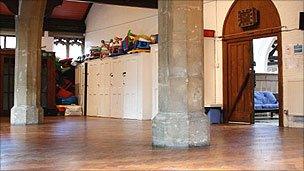Church hall plan for free school
- Published

St Luke's free school wants to use a church hall for classrooms
A north London group aiming to open one of the first parent-led "free schools" is planning to hold its lessons in a church hall.
The proposed St Luke's primary school in Hampstead wants to accept its first pupils in September 2011.
The church group says it has 50 children who are "definitely" going to take up places.
These new independent schools in England, set up by parents, will be funded by the government.
The proposers of the free school are now waiting to hear from the Department for Education whether their application has been successful.
This application illustrates how such free schools will operate - with St Luke's one of the first examples of parents wanting to set up a primary free school.
Small class sizes
The St Luke's application reflects the government's suggestion that small schools might be set up in converted buildings.
This proposal in Hampstead is based around St Luke's Church of England parish - with the free school supporters saying that it would provide extra places in an area where there is particular pressure on primary school places.
The application sets out an initial intake of 15 pupils per class - with an expectation of more pupils in each class in future years.
The group behind the school says it will have the same community ethos as the church - and that setting up a school will be an extension of youth projects already taking place in the parish.
It says it expects to serve pupils from different ethnic and social backgrounds.
Penny Roberts, a teacher and one of the leaders of the proposed school, says that a lack of school places has been one of the most important reasons for wanting to create the new school.
The application sent to the Department for Education also notes that there is a particular shortage of places in church schools in the Camden area.
In terms of the facilities which would be needed, the bid will depend on receiving funds from the education department to convert the hall and equip it with furniture, books and technology.
So far the St Luke's group has not decided how admissions rules would operate if there are more applications than there are places.
Free schools will be expected to comply with the admissions code - but there will still be options on how to prioritise between applicants.
Political controversy
Local authorities will not be able to block the opening of free schools - approval for funding will be determined by the education department.
St Luke's local council, the London Borough of Camden, is waiting to see how these free school plans will develop.
"We do not yet know what will be expected of free schools but are interested in talking to anyone who is considering establishing a free school in the borough," said a Camden council spokesperson.
"The council will need to consider the extent to which it will support specific applications on a case-by-case basis."
The free school policy remains politically controversial.
Education Secretary Michael Gove argues that it will increase parental choice and drive up standards.
But the policy is expected to face criticism at the Liberal Democrat annual conference - even though the party is in the coalition pushing through its introduction.
Before becoming deputy prime minister, Liberal Democrat leader Nick Clegg had described free schools as a "disaster for standards".
There is also opposition from teachers' unions.
Chris Keates, leader of the NASUWT teachers' union, attacked free schools this week as too expensive and likely to lead to social segregation.
"The public is opposed to schools being taken out of the control of democratically elected local councils and they are equally incensed that this is being done without any proper consultation," she said.
- Published14 July 2010
- Published18 June 2010